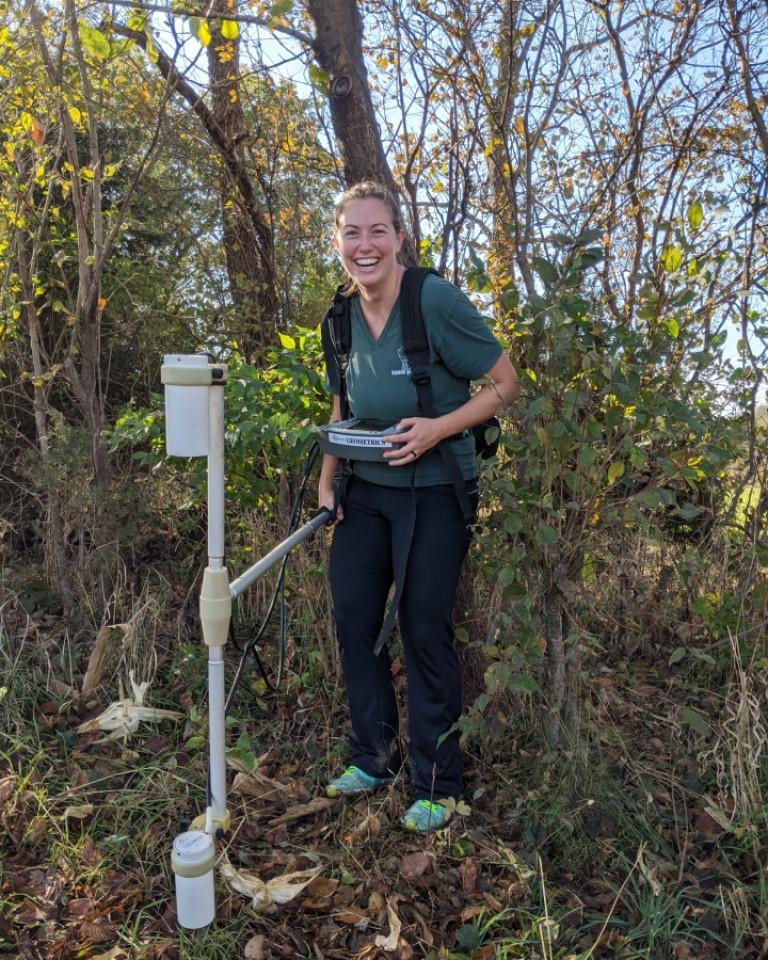Blair Schneider

MENTOR SPOTLIGHT | MARCH 2021
Department: Kansas Geological Survey
Describe your research/creative scholarship in a few sentences that we can all understand: My specialty is near-surface geophysics. This means I use physical methods (i.e. magnetics, electrical properties, etc.) to study the earth’s subsurface. The methods are non-invasive too, which means I can take pictures of the ground without ever having to dig. I apply these methods to conduct research at archaeological sites, as well as assist local law enforcement with forensic investigations.
Q: How did you first get interested in doing research or creative work?
A: Completing a research project was actually a requirement of my geology program at my undergraduate program. I was not sure what I wanted to do, so I started a project with my geophysics faculty mentor in my junior year to see if I liked it. We were using a magnetometer to locate an old icehouse foundation. I remember it was cold and tough work, but I loved every minute of it. It was the first time I was really seeing myself “do science.” I was hooked, and signed up for two more research projects before I graduated.
Q: What do students in your discipline learn by doing research that they wouldn’t learn by just taking classes?
A: Research is different from classes because you are in charge from start to finish. Starting with defining the question you want to address, figuring out how you can measure it, collecting the data, and interpreting your results. It is a rewarding path, but most classes will not have the time or resources to allow you to complete that path in one semester. In my research specifically, you have to do a lot of fieldwork as well. While most people think of just collecting the data outside, there is also a people component that tends to be overlooked. The entire time you are collecting data, people will always stop to see what you are doing and why. You have to learn to communicate your science and its significance, which is also something I never learned in a classroom setting.
Q: What do you find to be the most exciting part of doing research or creative work? What makes this line of work meaningful and interesting to you?
A: Geophysics is unique because it is interdisciplinary. You have to have a good background in both geology and physics to apply the methods, but that is just the beginning. You also have to have a fair amount of knowledge about the problem you are trying to solve, or you will never be able to interpret your data. For example, I apply geophysical methods for archaeology. In order to do that, I have now completed enough classwork, fieldwork, and technical work for an additional archaeology degree on top of my geology degrees. More recently, I’ve been expanding into forensic investigations, which requires even more learning. That is what makes this the most meaningful to me – I never stop learning new things.
Q: What advice do you have for undergraduates interested in doing research in your field?
A: I have two pieces of advice actually. 1) Start as early as you can and; 2) Apply for funding to support your research activities! The earlier you begin, the more research opportunities you can try out to figure out what type of research you like doing. There are also many different funding opportunities through the University, local organizations, and professional societies that provide financial assistance for your research. Often times these scholarships and awards are under-subscribed, so throw your name in the hat!
Q: For many students, doing research or a larger creative project is the first time they have done work that routinely involves setbacks and the need to troubleshoot problems. Can you tell us about a time that your research didn’t go as expected? Or about any tricks or habits that you’ve developed to help you stay resilient in the face of obstacles?
A: Oh boy, which example should I pick! When I first started my master’s degree, I had a site lined up in Iowa with the National Park Service. I spent my whole first year preparing for that, doing the background research, etc. About a month before I was supposed to go, the site fell through due to some legal complications. I was stunned! I turned to my mentors, and they quickly helped me find a new site. Within a few weeks, I was out there collecting data. Having good relationships with my mentors, as well as a broad network, has been fundamental to helping me deal with research setbacks. We are all in this boat together after all, so it is important to support one another during the journey.
Q: How do you spend your time outside of work?
A: I definitely stay busy outside of work time. I love to exercise and play sports with my partner – volleyball and kickball are our favorites. I have a young daughter who takes up most of my time (happily of course!) and I have been a foster mom for two years now. At this stage of my life, my family and our dog Rosa take up the majority of time and I would not have it any other way!